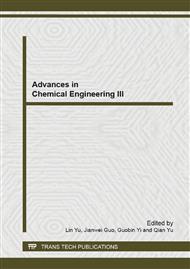p.2165
p.2170
p.2174
p.2179
p.2184
p.2189
p.2195
p.2201
p.2205
The Degradation of Organophosphorous Pesticide Wastewater by Sonophotocatalytic Oxidation Technology
Abstract:
Organophosphosphous pesticides wastewater was degradated by sonophotocatalytic oxidation technology,and some factors affecting sonophotocatalytic oxidation reaction were studied in details such as different degradation modes,the time of degradationinitial solution concentration initial pH valuethe amount of catalyst and the effect of Fenton,etc.In the end the optimal conditons were determined.The conclusion we drawed was that the optimal time of degradation was 100min initial solution concentration was 100mg/Lthe amount of catalyst AgBr/TiO2 was 0.6g,moreover the adding of Fenton could greatly enhance the degradation rate.
Info:
Periodical:
Pages:
2184-2188
Citation:
Online since:
September 2013
Authors:
Price:
Сopyright:
© 2013 Trans Tech Publications Ltd. All Rights Reserved
Share:
Citation:


